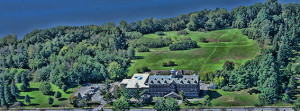Burlington College’s intent to sell off much of its lakeside acreage drew opposition when it was announced two years ago. Now, as a development plan awaits City Council approval, the grumbling continues. Some of the grumblers apparently cling to an obsolete fantasy: namely, that most of the property could be spared development and conserved as greenspace. 
Thumbnail history: In 2011 the college bought 32 acres from the Catholic diocese for about $10 million, then came to the realization, after a couple years of stagnant enrollment, that it couldn’t afford the payments. To survive, the college would have to sell off a big chunk of the land, and it revealed its plan to do so to housing developer Eric Farrell a little over two years ago.
The deal wasn’t done, though, and there was a window of many months when someone else — someone like the Nature Conservancy, say, or a land trust — could have stepped forward to offer the $7 million or so that would have been necessary to buy the developable land for conservation purposes. No one did, though. That’s why the greenspace fantasy is obsolete.
Not developing the land was not an option, at least if Burlington College wass to stave off bankruptcy. And if the college were to go belly up, well, then ownership of the property would have reverted to creditors (principally a bank), leading to a development scenario perhaps less palatable than Farrell’s.
If there’s anything reasonably left to grumble about, it’s in the details of the agreement the City Council will review next week. Among those details, as we understand them: The city is acquiring 12 lakeside acres for $2 million to be maintained as parkland (a parcel, by the way that has been appraised at $2.9 million). Farrell will develop about 550 housing units on 16 acres, of which 160 will be affordable to families of income below 65 percent of the median, with other units targeted to people of moderate income, while the rest are market-rate; and 200 beds for students on a parcel the college will retain for its campus.
This much is clear: The city is in desperate need of more affordable housing, and it has its inclusionary zoning ordinance to thank for the affordable units in this scheme, and (2) This inclusive new neighborhood, as planned, will be one of exemplary economic diversity.